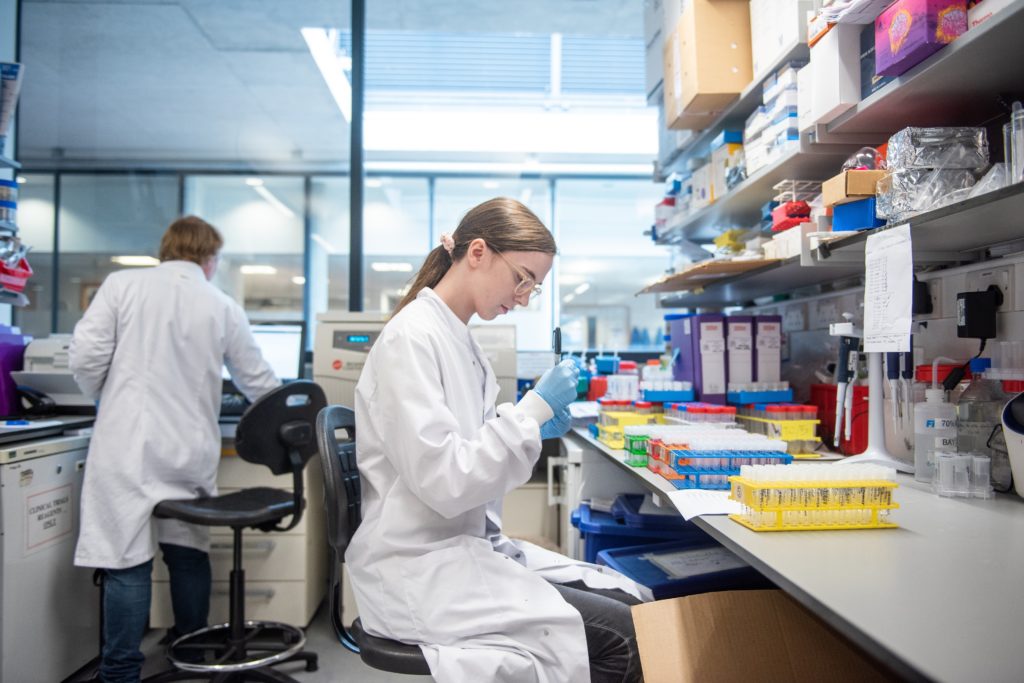The Oxford Biomedical Research Centre is the only NIHR BRC with a vaccines theme, and this has allowed us to be at the forefront of the development of a wide range of vaccines since our BRC was established in 2007. The value of our vaccine know-how – from discovery and manufacture to first-in-human studies and large-scale efficacy trials – was best illustrated by our contribution to the development of the ChAdOx1nCoV-19 (Oxford-AstraZeneca) vaccine. By 1 August 2022, more than 3 billion doses have been deployed worldwide, saving an estimated 6.3 million lives.

Building on this success, the theme will continue to innovate in vaccine science, while developing a programme to protect the NHS; this includes a portfolio of new vaccine development, manufacturing science, experimental medicine, including human infection challenge, and evaluating new vaccines.
This programme provides unparalleled training opportunities for a new generation of vaccine experts, which, combined with our extensive infrastructure in vaccine immunology, clinical trials and manufacturing, will ensure we are best prepared to respond to future threats.
Patient and public involvement and engagement is central to the Vaccines Theme, and we have 26 regular public reviewers, representing a broad range of ages and ethnicities. The theme, which has strong connections with NHS trial sites across the UK as well as a global network of investigators, has five sub-themes:
Theme Lead: Professor Sir Andrew Pollard
Co-theme Lead: Professor Eleanor Barnes
Sub-theme 1: Outbreak pathogens
Led by Dame Sarah Gilbert and Professor Teresa Lambe
We are developing our portfolio of vaccines against bacterial and viral pathogens – such as plague, MERS or Ebola – enabling us to respond to future outbreaks, epidemics and pandemics. Read more
Sub-theme 2: Enteric vaccines
Led by Professor Maheshi Ramasamy
Building on the successful licensing of a global typhoid conjugate vaccine, we are evaluating new vaccines against other major enteric pathogens, which affect the intestines. Read more
Sub-theme 3: ‘The big three’ – TB, malaria and HIV
Led by Professor Simon Draper
We are testing next-generation malaria vaccines, as well as new techniques, such as using aerosol to deliver TB vaccines. As part of the NIHR CHERUB collaboration, which is looking for a cure for HIV, we are supporting latency-targeting vaccines and other immunotherapeutic approaches. Read more
Sub-theme 4: Childhood / pregnancy / perinatal vaccines
Led by Dr Simon Drysdale
Since 2007, the BRC has provided key data that underpins the NHS immunisation schedule and global policy. We are focusing on vaccines that are priorities for the NHS, such as RSV and neonatal meningitis, as well as leading the evaluation of COVID-19 vaccines for children. Read more
Sub-theme 5: Vaccines in chronic disease and ageing
Led by Professor John Frater and Professor Susanna Dunachie
Working with patient groups, we are investigating the changes to the immune system that mean some adults – such as older people or those with underlying chronic diseases – do not respond well to vaccines, and trying to identify solutions. We are also testing approaches to prevent and treat persistent viral infections such as HIV and hepatitis B and C. Read more
Expertise
Our work on vaccines is underpinned by expertise in the following areas:
Vaccine immunology
Led by Professor Teresa Lambe.
Harnessing Oxford’s expertise in immunology, we are developing strategies to give us a deeper understanding of vaccine immunity.
Human infection challenge (HIC) models
Led by Sir Andrew Pollard
The Oxford BRC’s use of HIC models to develop vaccines has allowed vaccines to be selected for field trials for malaria and influenza, and provided key data to support the WHO’s use of typhoid vaccine. We are now using this model to accelerate many other vaccine programmes, such as a SARS-CoV-2 challenge that is providing new insights into protective immunity. Our new Experimental Medicine Clinical Research Facility provide the ideal setting for the rapid evaluation of priority diseases such as TB, influenza and RSV, as well as support for BRC programmes in malaria and salmonella infection
Manufacturing
Led by Professor Cath Green
In-house manufacturing was essential to our ability to rapidly produce the vaccine for the COVID-19 phase I trials in 2020. We are now expanding our portfolio to include other vaccines for early phase trials, including recombinant proteins, conjugates, VLPs (virus-like particles), OMVs (Outer Membrane Vesicles) and monoclonal antibodies. We are creating greater capacity, allowing us to offer this service to other UK academic collaborators, and we are working with the newly established Vaccine Manufacturing Innovation Centre (VMIC) to support process development and technology transfer for larger scale manufacturing
Public engagement
Led by Samantha Vanderslott
As part of our commitment to improving public understanding of vaccines, the Oxford BRC-hosted Vaccine Knowledge Project, one of the most visited vaccine information websites in the world, will be expanded and promoted through social media, partner organisations and key influencers, with an emphasis on under-represented communities. We are also working with social scientists in the Oxford Health BRC on an ongoing collaboration about vaccine hesitancy to inform communication about vaccines with marginalised groups.